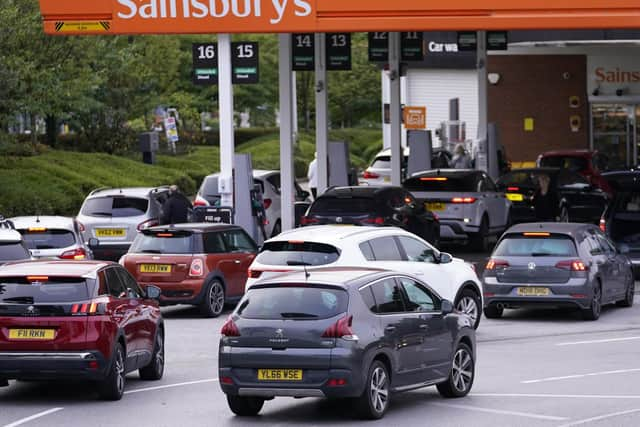Why panic at petrol pumps following lorry driver shortages is sign of wider crisis - Greg Wright
According to Adams, the words “Don’t Panic” could be found in large friendly letters on the front cover of the mythical guide to provide reassurance for intergalactic travellers. Adams may well have intended it as a message for all of us during times when humanity appears to have taken leave of its senses.
The alarming scenes at petrol stations over recent days have caused anger and dismay. People have been infuriated by the panic-stricken and selfish behaviour of many motorists, with images of consumers filling up to 12 Jerry cans of petrol at the pumps being shared in horror across social media platforms.
Advertisement
Hide AdAdvertisement
Hide AdSo why the fuss? This sad saga started because of reports that BP had warned the Government that it would not be able to fulfil all deliveries due to HGV driver shortages. This caused a panic and led to the sombre - and occasionally bad-tempered - queues which have been stretching for several blocks from many petrol stations.


All this anguish, which has caused particular misery for essential workers who cannot get to work without their car, was completely avoidable.
There is enough petrol and diesel to go round. Oil giant ExxonMobil, for example, which operates Esso forecourts and runs the UK’s largest refinery, said it is operating as normal and has strong supply to distribution sites.
The problem is getting it to the pumps and reacting to the latest surge in demand, which led the Petrol Retailers Association to warn that as many as two thirds of its membership of nearly 5,500 independent outlets were out of fuel on Sunday.
Advertisement
Hide AdAdvertisement
Hide AdSo how to explain this madness? Why, when Ministers have called on people to stop panic-buying petrol, are so many of us doing the opposite?
Part of the solution might be a strategy to make consumers aware of how their actions affect supply chains.
Rick Tellez, the co-founder of supply chain logistics platform KlearNow, said most consumers wanted to do the right thing by maintaining normal shopping behaviour but the actions of a small number can cause chaos.
Mr Tellez called on the logistics sector and the Government to do more to educate consumers about the part they play in the global supply chain.
Advertisement
Hide AdAdvertisement
Hide AdA survey carried out on behalf of KlearNow found that 57% of UK consumers who stockpiled during lockdown said they regretted it and would not do it in future. Of those who stockpiled for lockdown, 19% said they had products left over after restrictions were lifted and 7% still have items now.
Mr Tellez said scenes of panic buying at petrol stations pointed to a lack of trust in the logistics sector.
He said: “Our research suggests that most consumers understand that stockpiling is unnecessary and lockdown taught us all some valuable lessons. But it only takes a tiny minority of consumers to panic to make it look like there’s a national crisis, which is when things begin to escalate.
“Supply chains are designed to be resilient and thanks to advancements in technology, including artificial intelligence, we are able to adapt to changing consumer needs. However, if consumer behaviour changes dramatically – as it did at the start of the pandemic – there will always be a bit of disruption whilst suppliers adapt.”
Advertisement
Hide AdAdvertisement
Hide AdTo me, this panic reflects a broader breakdown of trust. Unlike our ancestors, of say, 60 years ago, we are reluctant to take the Government at its word. We are more pessimistic and inclined to believe we will have to fend for ourselves. The swift flow of information through social media channels also acts as a catalyst for panic-stricken behaviour.
In many circumstances, a willingness to challenge the official narrative is to be applauded. In this case, the panic-buyers should have listened to the Government, taken a deep breath and only filled up when it was necessary.
The Government must reflect on how it can rebuild trust. It must find ways of ensuring statements made in the public interest are taken to heart by millions of consumers and peace returns to the forecourts.
Support The Yorkshire Post and become a subscriber today. Your subscription will help us to continue to bring quality news to the people of Yorkshire. In return, you'll see fewer ads on site, get free access to our app and receive exclusive members-only offers. Click here to subscribe.